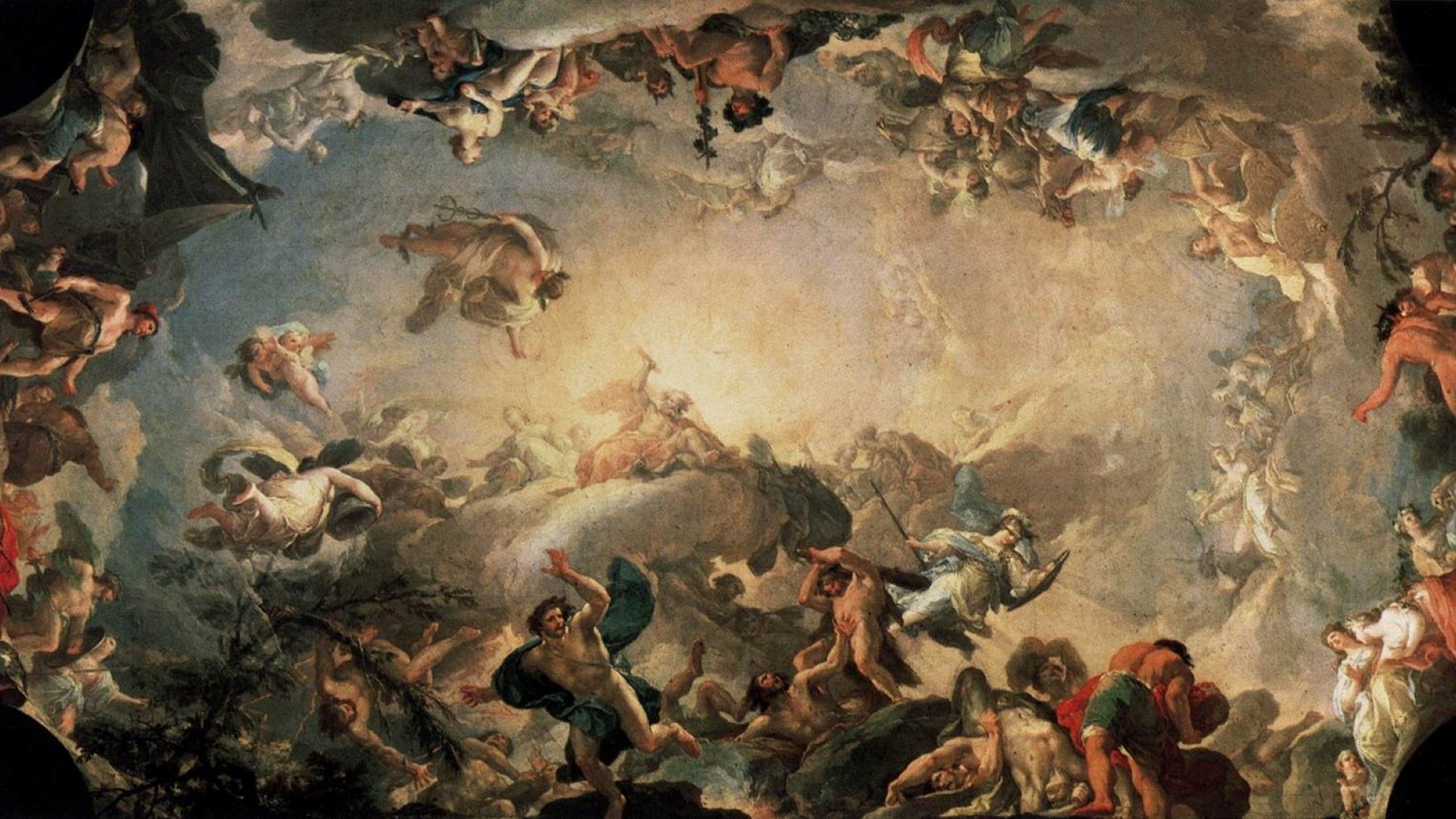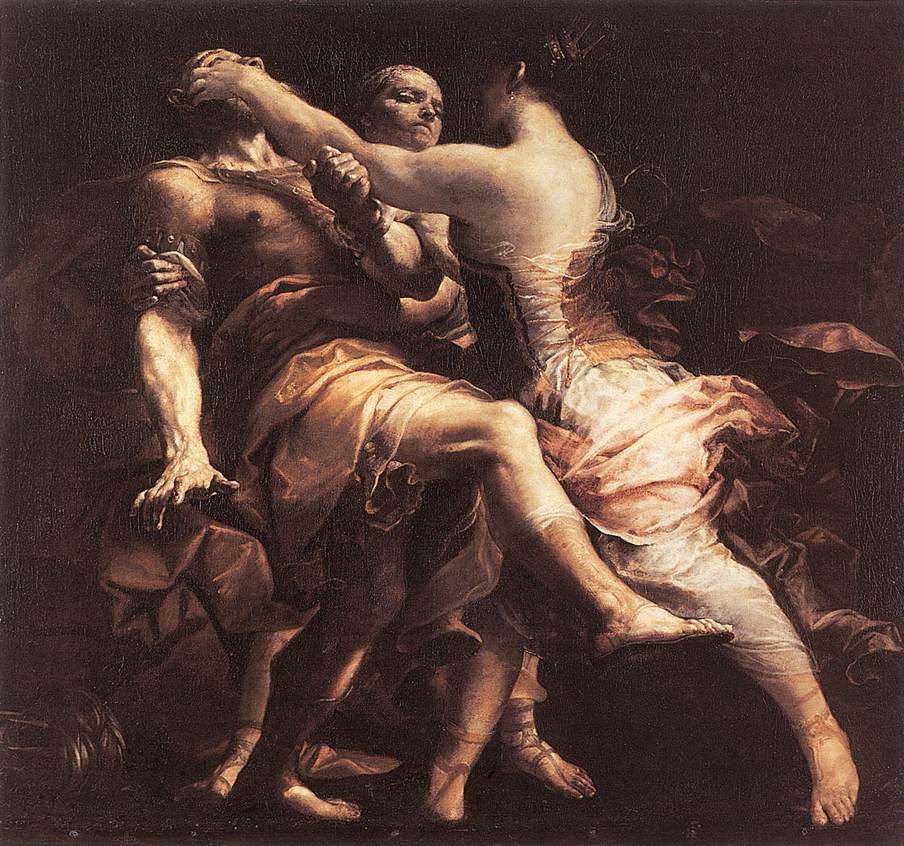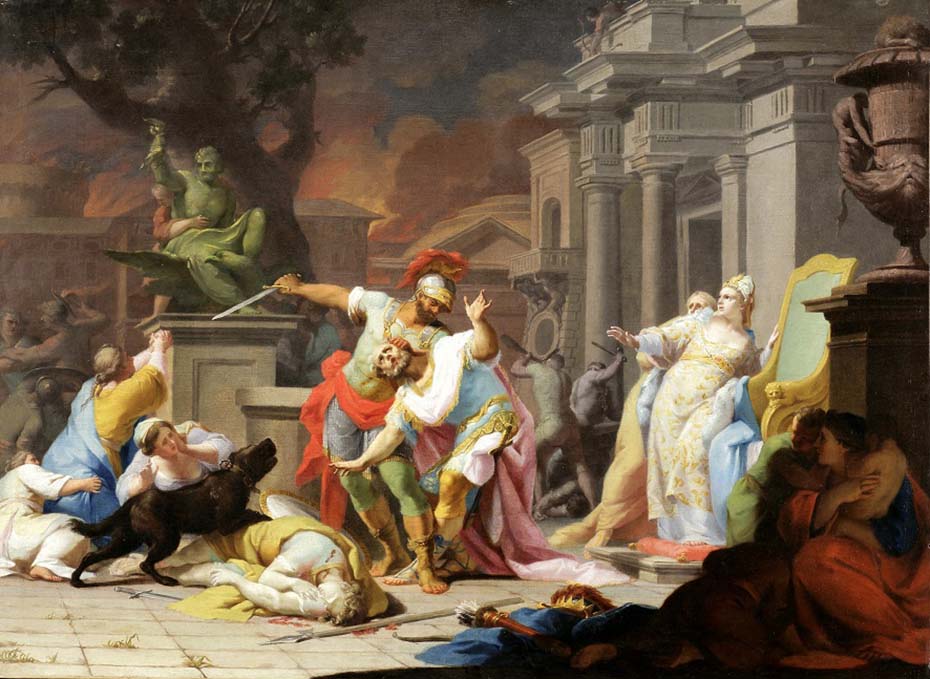
Ilione

Ilione was the oldest daughter of King Priam and Queen Hekabe of Troy. Her husband was the Thrakian king Polymestor. She is briefly mentioned in Virgil's Aeneid: Aeneas gives her scepter to Dido.
Ilione plays a significant role in a version of the story of her younger brother Polydorus. He had been entrusted by Priam and Hecuba to the care of his older sister and her husband.
Ilione, who already had a son of her own, Deipylus, brought her brother up as her son, and her son as her brother, thinking that if anything happened to one of them, she could return the other one to her parents in any case. So when Polymestor was instigated by the Greeks to kill the son of Priam, he killed Deipylus instead, taking him for Polydorus. The real Polydorus thus survived and escaped.
Later, he went to inquire the oracle at Delphi about his parents, and was answered that his native city had been destroyed, father killed, and mother enslaved. Still thinking that he was the son of Polymestor and Ilione, Polydorus thought that the oracle must have been wrong, and asked Ilione about it.
She told him all the truth and suggested that he take revenge on Polymestor; Polydorus then blinded and killed him.
Ilione was said to have eventually committed suicide, grieving at her parents' deaths.
Ilione in Classical Text
Hyginus, Fabulae, 109
When Polydorus, son of Priam by Hecuba, was born, they gave him to Priam's daughter Iliona to be reared. She was the wife of Polymnestor, King of the Thracians, and she brought him up as her own son. She brought up Deipylus, who she had conceived by Polymnestor, as if he were her brother, so that if anything happened to either of them she could give the other to her parents.
But when, after the fall of Troy, the Achaeans wanted to destroy the race of Priam, they cast down Astyanax from the walls, and sent messengers to Polymnestor promising him Electra in marriage together with a great amount of gold if he would put Polydorus, son of Priam, to death. Polymnestor did not oppose the words of the ambassadors, and slew his own son Deipylus unwittingly, thinking he had killed Polydorus, son of Priam.
Polydorus, however, went to the oracle of Apollo to inquire about his parents and was told that his city was burned, his father killed, and his mother held in servitude. When he returned and saw that things were not as the oracle had said . . . thinking he was the son of Polymnestor, he asked his sister Iliona why the oracle had spoken falsely. His sister revealed the truth to him, and by her advice he blinded Polymnestor and killed him.
Hyginus, Fabulae 243
"Hecuba, daughter of Cisseus or of Dymas, wife of Priam, threw herself into the sea; for this reason the sea is called Cynean, since she was changed into a dog. Ino, daughter of Cadmus, hurled herself into the sea with her son, Melicertes. Anticlia, daughter of Autolycus and mother of Ulysses, killed herself on hearing a false report about Ulysses. Stheneboea, daughter of Iobas, and wife of Proetus, killed herself out of love for Bellerophon.
Evadne, daughter of Phylacus, because Capaneus, her husband, perished at Thebes, threw herself on the same funeral pyre. Aethra, daughter of Pittheus, killed herself because of the death of her sons. Dejanira, daughter of Oeneu, killed herself on account of Hercules; deceived by Nessus, she had sent him a tunic in which he was burned. Laodamia, daughter of Acastus, killed herself out of longing for her husband Protesilaus.
Hippodamia, daughter of Oenomaus and wife of Pelops, killed herself because by her urging, Chrysippus was killed. Neaera, daughter of Autolycus, killed herself on account of the death of her son Hippothous. Alcestis, daughter of Pelias, for the sake of her husband, Admetus, died a vicarious death. Iliona, daughter of Priam, killed herself on account of the misfortunes of her parents. Themisto, daughter of Hyspeus, killed herself because, at the instigation of Ino, she had killed her sons.
Erigone, daughter of Icarus, killed herself by hanging because of the death of her father. Phaedra, daughter of Minos, killed herself by hanging because of her love for her stepson, Hippolytus. Phyllis killed herself by hanging on account of Demophoon, son of Theseus. Canace, daughter of Aeolus, because of her love for Macareus her brother, killed herself. Biblis, daughter of Miletus, out of love for Caunus killed herself. Calypso, daughter of Atlas, out of love for Ulysses, killed herself.
Dido, daughter of Belus, out of love for Aeneas killed herself. Jocasta, daughter of Menoecus, killed herself on account of the death of her sons and the disgrace. Antigona, daughter of Oedipus, killed herself on account of the burial of Polynices. Pelopia, daughter of Thyestes, killed herself on account of her father's crime. Thisbe of Babylon killed herself because Pyramus had killed himself. Semiramis in Babylon, when her horse was lost, threw herself on the pyre."

Sources
Hyginus, Fabulae, 90
Virgil, Aeneid, 1. 653, with the commentary by Servius
Hyginus, Fabulae, 109
Hyginus, Fabulae, 243
"Wikia"
Our Mobile Application
Check out Our Mobile Application "Ancient Greece Reloaded"


